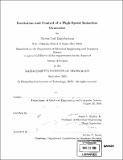Excitation and control of a high-speed induction generator
Author(s)
Englebretson, Steven Carl
DownloadFull printable version (5.839Mb)
Other Contributors
Massachusetts Institute of Technology. Dept. of Electrical Engineering and Computer Science.
Advisor
James L. Kirtley, Jr.
Terms of use
Metadata
Show full item recordAbstract
This project investigates the use of a high speed, squirrel cage induction generator and power converter for producing DC electrical power onboard ships and submarines. Potential advantages of high speed induction generators include smaller size and weight, increased durability, and decreased cost and maintenance. Unfortunately, induction generators require a "supply of reactive power" to run and suffer from variation in output voltage and frequency with any changes to the input reactive power excitation, mechanical drive speed, and load. A power converter can resolve some of these issues by circulating the changing reactive power demanded by the generator while simultaneously controlling the stator frequency to adjust the machine slip and manage the real output power. This combination of real and reactive power control will ensure a constant voltage DC bus over the full load range. Tests were performed on a three horsepower motor to help validate models and simulations at both the two kilowatt and 5 megawatt level. After determining the equivalent circuit of the demonstration motor, it was tested as a generator under grid connected and capacitor excited conditions. A stand-alone five megawatt, 12,000 RPM generator designed specifically to operate at high efficiency and power factor over the full load rang was used to design converter parameters. A variety of reactive power excitation strategies were briefly examined before the flow of reactive currents through a converter was explained using a six step inverter with two different switching schemes. (cont.) Steady state and transient simulations matched the measured machine performance and illustrated the performance of the control strategy as the load changes. Keywords: induction generator, self-excitation, reactive power, power converter, rectifier.
Description
Thesis (S.M.)--Massachusetts Institute of Technology, Dept. of Electrical Engineering and Computer Science, 2005. Includes bibliographical references (leaves 97-99).
Date issued
2005Department
Massachusetts Institute of Technology. Department of Electrical Engineering and Computer SciencePublisher
Massachusetts Institute of Technology
Keywords
Electrical Engineering and Computer Science.